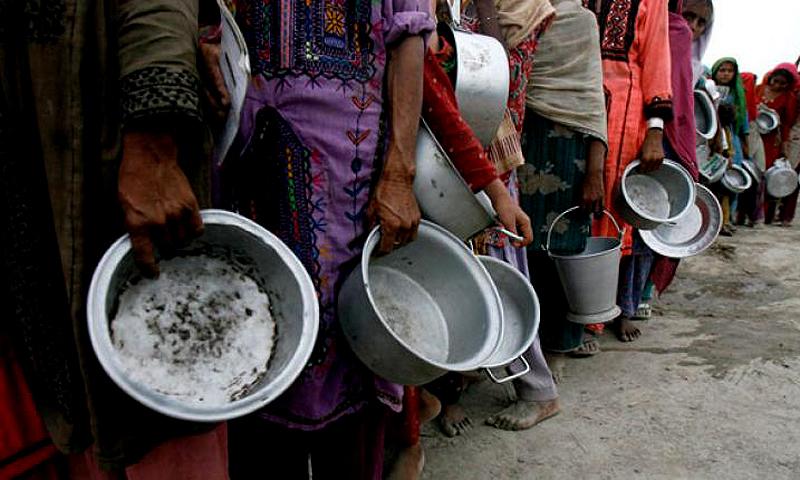Hunger Could Claim More Lives Than Covid-19 Worldwide: Oxfam Report

Amid the lockdowns imposed in several countries across the world, a new Oxfam report has warned that 121 million people could be pushed to starvation this year and hunger could potentially end up killing more people than the COVID-19 pandemic.
As many as 12,000 people could die per day by the end of the year as a result of hunger linked to COVID-19, said the report, while noting that the daily mortality rate for COVID-19 reached its highest recorded point in April 2020 at over 10,000 deaths per day.
In its report titled ‘The hunger virus: how COVID-19 is fuelling hunger in a hungry world’, Oxfam says that the crisis is the result of the social and economic fallout of the pandemic which has led to unemployment, disruption to food production and supplies, and declining aid.
“The knock-on impacts of Covid-19 are far more widespread than the virus itself, pushing millions of the world’s poorest people deeper into hunger and poverty. It is vital governments contain the spread of this deadly disease, but they must also prevent it from killing as many – if not more – people from hunger,” said Danny Sriskandarajah, chief executive of Oxfam GB.
“Governments can save lives now by funding the UN Covid-19 appeal and supporting the call for a global ceasefire to end the conflict in order to tackle the pandemic,” he added.
The report points out that the situation in the world’s 10 worst hunger ‘hotspots’, including Afghanistan, Syria, South Sudan etc. where the food crisis is severe is getting worse as a result of the pandemic. Closed borders, curfews and travel restrictions have disrupted the food supplies in many countries.
Courtesy: Oxfam report
The report warns that the middle-income countries such as India, South Africa, and Brazil would be the emerging epicentres since they are experiencing rapidly rising levels of hunger as millions of people who were just about managing have been tipped over the edge by the pandemic.
“Even the world’s richest countries are not immune. Data from the UK government shows that during the first few weeks of the lockdown as many as 7.7 million adults reduced their meal portion sizes or missed meals, and up to 3.7 million adults sought charity food or used a food bank,” says the report.
In India, during 2019, 195 million people – 14.5% of the population – were malnourished as a result of extreme inequality, a lack of investment in rural communities (which are home to 70% of the population), failure to protect workers living in poverty, corrupt and inefficient systems of distributing food aid and social support, and an increasingly erratic and extreme climate.
As the central government announced a nationwide lockdown to control the spread of the coronavirus, with just four hours’ notice, “millions of people who were already living precarious existences on the brink of hunger – rural communities, lower castes, minority groups, women and children – were suddenly tipped over the edge”.
“An estimated 40 million people, predominantly lower-caste migrant workers who make a living as domestic workers, street vendors or daily wage labourers on construction sites, were made jobless overnight. Facing starvation and disease in the overcrowded slums they call home, and with public transport shut down, hundreds of thousands of people began walking sometimes hundreds of kilometres back to their villages,” said the report.
“Strict restrictions on travel have also left farmers without a migrant labour force at the peak of the harvest season, forcing many to leave crops in the field to rot. This is having a huge impact on farmers' incomes and the food security of rural communities,” the report added.
For example, tribal groups and forest dwellers earn the majority of their annual income from the sale of forest products such as tamarind and karanj seeds. However, travel restrictions have prevented traders from reaching them during the peak harvest season, depriving them of this income.
A survey, after five weeks of lockdown, of 5,000 rural households across 12 states revealed that half were having to cut back on the number of meals they ate, while almost a quarter had been forced to ask others for food since the lockdown began.
“It also showed that a significant proportion of households are getting into debt or selling assets to get by, with 22% of households reporting having to sell livestock and 16% saying they had recently borrowed from moneylenders.”
The report also points out that though the Indian government has announced a $22.5 billion stimulus package to support businesses and families through the crisis, corruption and poor planning means millions of India’s most vulnerable people have been unable to access assistance, including more than 95 million children from poor communities who no longer have access to midday meals because of the sudden closure of Anganwadi (early childcare) centres.
Get the latest reports & analysis with people's perspective on Protests, movements & deep analytical videos, discussions of the current affairs in your Telegram app. Subscribe to NewsClick's Telegram channel & get Real-Time updates on stories, as they get published on our website.
























